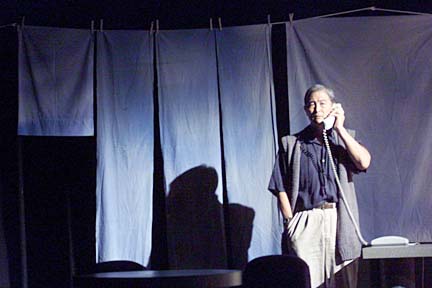


A powerful American tragedy is brought to a new audience with Manoa Valley Theatre's production of "The Wash." Playwright Philip Kan Gotanda's tale of the failed marriage of Nobu and Masi Matsumoto was first staged here by eight years ago by Kumu Kahua in Tenney Theatre. Family laundry comes
clean in ‘Wash’
"The Wash": Runs 7:30 p.m. Wednesdays and Thursdays, 8 p.m. Fridays and Saturdays, and 4 p.m. Sundays through Dec. 2. Tickets $25. Call 988-6131.
Review by John Berger
jberger@starbulletin.comDirector Lyn Kajiwara Ackerman and set designer Joseph D. Dodd present it with a brighter and lighter look at MVT while retaining the emotional impact and dramatic nuances of Gotanda's story.
Nobu and Masi have been married for 42 years and have two adult daughters. Masi decides that she's had enough, moves out, and starts drifting toward divorce. Nobu can't believe it's happening and doesn't understand why she left. He spends his days watching television in the home they shared. Masi, who still does his laundry, stops by each week to pick up the dirty clothes and drop off the clean ones.
Gotanda explores the ruined marriage with the skill and patience of an archeologist assembling a piece of ancient pottery out of crumbling shards of clay. Each fragment becomes part of a mosaic of human tragedy that transcends the details of ethnicity.
Nobu is a victim of his cultural upbringing and of his wartime experiences as a West Coast Japanese-American internee, but it becomes clear that Nobu is first and foremost a victim of his own personality and attitudes. Therein lies the tragedy.
Allen Y. Okubo is excellent as Nobu. Okubo and director Ackerman interpret the character in such a way that the audience can see the feelings that the stoic Nobu keeps hidden from his wife and daughters. And, while Nobu's verbal abuse of Masi and his racist attitudes prevent him from every becoming a likable character, Okubo's beautifully developed portrayal allows us to feel the man's pain and appreciate at least some of the reasons why he is what he is.
Florence Chang (Masi) is equally commanding as the long-suffering Japanese-American wife who finally decided that she'd been called "stupid" one time too many. In the subtle nuances of Chang's performance are seen the jumble of emotions that can occur when someone realizes the need to escape from a relationship, even as residual feelings for the person they've left behind linger.
Dann Seki brings a perfect blend of optimism and deft comic skills to his portrayal of Sadao Nakasato, an articulate and expressive Japanese-American widower who has the sensitivity and communications skills Nobu lacks. Herein is found Gotanda's line in the sand: Sadao and Nobu are of the same generation, and we can assume since this is a Gotanda play that Sadao is also an ex-internee, but their outlook and approach in life could hardly be more different.
Nan Asuncion adds a broad comic presence as Chiyo Froelich, a loud beauty parlor owner with a taste for garish clothes. The impact of Asuncion's fine comic performance is heightened by costume designer Athena Espania's success in finding some truly loud garb for her.
Maybe it's a coincidence, but as in "Sisters Matsumoto," the story includes one character who is a Japanese-American from Hawaii and who is also a bit cruder and more comical than the Japanese-Americans of Gotanda's own West Coast milieu. "Sisters Matsumoto" had Bola (portrayed last year by Keith Kashiwada); "The Wash" has Curly Sakata, a cook at a Japanese restaurant, who enjoys drinking beer, burping, "all kine stink food" and scratching his butt.
Veteran character actor Dennis Ihara has a great time while delivering a strong comic performance as the jolly easy-living cook. Ihara was a big hit with the opening night audience. His rendition of "Tiny Bubbles," and his comments about the importance of drinking beer and "letting things out," were particularly well received.
Joy Minaai (Marsha Matsumoto) makes a memorable local theater debut with her poignant scene opposite Okubo.
Jackie Jordan (Judy), best known for her work behind the lights at MVT, likewise illuminates the depths of the tragedy when she appears opposite Okubo as the daughter Nobu cannot forgive for marrying a non-Japanese. Sue Shiroma Nada (Kiyoko) completes the talented cast.
Set designer Dodd uses a few pieces of furniture to define different locales across the big open set.
Rows of oversized clothes strung on clotheslines provide the backdrop; the blue-white bleached-bright garments suggest the cold lifelessness of the relationship between Masi and Nobu Matsumoto.
Jason Taglianetti (sound design) adds other subtle embellishments to this excellent production.
Click for online
calendars and events.